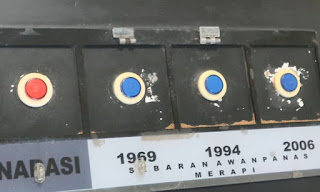A study visit at the Merapi Volcano Museum
By Kresensia Risna Efrieno
Have you ever heard about the Merapi Volcano Museum (MGM)? This time, Stube HEMAT Yogyakarta with students conducted an exposure or study visit at the Merapi Volcano Museum (MGM) in Pakem, Sleman, DIY (27/2/2021). This exposure is part of the Climate Change and Life Survival Training to study volcanoes in Indonesia. This direct learning activity will enrich the experience of students learning volcanic topics.
The Merapi Volcano Museum is a museum that provides knowledge about Mount Merapi and other volcanic phenomena around the world in general. The Merapi Volcano Museum is designed to be a medium for sustainable conservation education as well as the development of science on volcanic disasters, earthquakes, and other natural disasters. This museum can be used as a means of education, disseminating information on aspects of volcanoes and other geological disasters that are reactive-educational for the wider community (mgm.slemankab.go.id).
Dozens of students from various regions in Indonesia who are studying at various campuses in Yogyakarta arrived at the MGM area which was built with unique building architecture, typical of mountain peaks. During the pandemic, the MGM management implemented proper health protocols, such as washing hands, checking the body temperature before entering, and reminding visitors to keep their distance. The replica of Mount Merapi in the middle of the room welcomed the visitors when they step into the museum. This replica is a property to show the year of the eruption of Mount Merapi and the direction of the lava avalanche by pressing the button of eruption year. The light will turn on to indicate the direction of the avalanche and a narrative can be heard from the loudspeaker according to the year of the eruption.
The
students seemed serious to listen to Dwi's explanation, a guide at MGM when
telling a diorama showing the condition
of a house after the eruption of Mount Merapi in 2010, where house and
furniture and even vehicles were destroyed by an avalanche. This incident
triggered student questions about how the condition of people at that time and
the belongings of the residents living on the slopes of Merapi which were affected
by the eruption. The student's curiosity about the existence of volcanoes in
Indonesia was answered in the Indonesian volcano room, even it was surprising
when the guide pointed out the spots of active volcanoes in Indonesia because
some participants did not realize that there was an active volcano near their
origin.
In another room, participants identified various forms of volcanoes and types of
eruptions. Especially Mount Merapi itself has a unique type of eruption so that
which is called the Merapi type, namely the eruption of lava domes and lava
avalanches that give rise to hot clouds. Completing the introduction of
volcanoes, the students observe the eruption detection devices of Mount Merapi.
Again, the participants expressed their curiosity about these tools. The
changes in times have made these tools updated in model and function according
to technological advances.
A study visit at the museum became a new experience and knowledge for students, as revealed by Natra Marten Nee, a participant from Kupang, NTT, "The interesting thing that I got from this museum was clues and evidence about the catastrophic eruption of Mount Merapi from year to year and the explanation of the guide related to active volcanoes in and outside Indonesia made me learn a lot about volcanoes."
Yes,
when people get to know a place to live deeper, it will make them learn how to
live, how to adapt to their surroundings, and how to maintain their life
survival. ***











Comments
Post a Comment